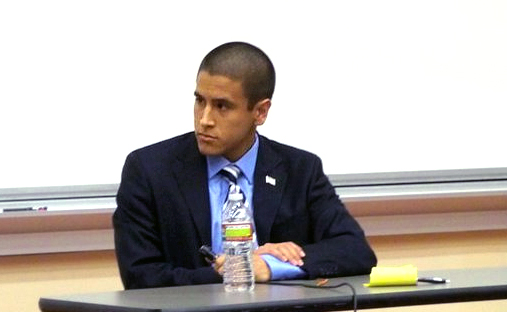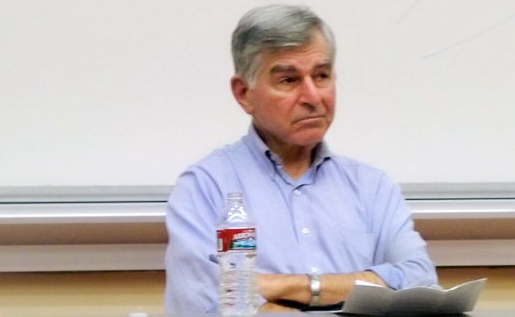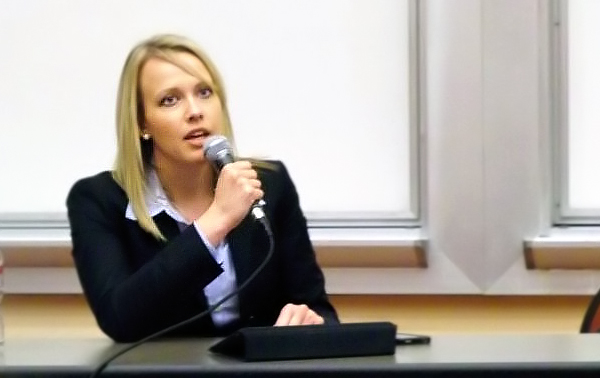
COURTESY OF ROSALIND PEPPY

COURTESY OF ROSALIND PEPPY
(From top to bottom) UCLA doctoral student and Tea Party specialist Emily Ekins, TeaPAC member Alvaro Day, and former Massachusetts governor Michael Dukakis speak at a discussion on the Tea Party, hosted by the Roosevelt Institute.
Political discourse in this country is on life support.
Even when the talking heads aren’t shouting at each other, they’re always arguing. Expecting citizens to navigate this tumultuous terrain is akin to asking a child to pick sides in a bitter divorce. Intelligent, honest, and non-argumentative discourse seems to have evaporated just as fast as our attention spans.
I came to this conclusion after attending the Roosevelt Institute’s Tea Party Deconstructed panel held on campus last Wednesday. The demographic group that has historically had the lowest levels of voting ironically has the greatest chance of making an informed vote ““ of bridging the ideological divide that currently holds this nation hostage. And all we really have to do is pay Google a visit.
Students are already doing this. The Roosevelt Institiute is a non-partisan, student-run think tank which discusses and sometimes publishes public policy. The panel they hosted, alongside Bruin Republicans, featured former Massachusetts governor and UCLA visiting professor Michael Dukakis and a Republican nominee for the California State Assembly, Alvaro Day. It was marketed as a chance to explore the Tea Party in depth. UCLA doctoral candidate and Tea Party specialist Emily Ekins certainly fulfilled her role in this regard. Dukakis and Day, on the other hand, shed little light on the Tea Party.
Instead, both provided a look into the landscape of political discourse we currently find ourselves in. They both debated facts. Both questioned the other’s adherence to the truth.
It’s exactly this type of discourse which pushes so many political science students away from public life and toward law school. It’s what turns so many of us away from politics all together. But as college students, we can breach this ever-growing cynicism. We can do our own research and find common ground.
When politicians cannot agree on what the facts are, a populace cannot be expected to elect who should represent them. When the basic tenets of reality are up for debate, democracy cannot function.
Hence the ultra-low voting levels amongst our generation. Not all of us need to, or should be, in the Roosevelt Institute, but we should all do enough basic research to know the different between a smear campaign and a debatable point. Day and Dukakis certainly argued. Like about how good American health care and schooling is, how Europe’s is in comparison, whether various legislation enacted by Clinton led to the housing bubble or enabled communities to be free from the tyranny of banks. They, above all, argued.
So much, in fact, that the lack of a moderator at the panel was made glaringly apparent. Luckily, one of the members of the Roosevelt Institute took initiative and demanded that the two panelists quit bickering and move on to the business of answering the audience’s questions.
During the question-and-answer session of the panel, one particularly insightful student asked Day to name one regulation he liked and for Dukakis to name one regulation he would do away with. It was perhaps the most low-key moment of the entire panel. Dukakis spoke about the deregulation of the alcohol industry in Massachusetts, while Day cited water regulations as something he wouldn’t abolish.
For a good 40 minutes previous, Day and Dukakis had been arguing over the role regulation played in the recession. Day said it caused it. Dukakis said there wasn’t enough of it. So this student’s question did exactly what college students ought to be doing ““ cutting through partisanship to find common ground.
College students are poised to tackle the challenges this type of discourse presents us with. As masters of the Internet, we can easily Google claims made by politicians to determine their validity. Or just check http://factcheck.org.
We are bred to be critical thinkers. To sift through claims made by a biased source to come to the reality of the situation. Or so we would like to think. If we’re truly as smart as we think we are, we’ll bite the bullet, do our research, and vote for the better candidate, support the better policy initiative. We’ll try to find the common between two ideological poles.
As a mostly liberal campus, most of us do think that the government has a large role to play in maintaining and improving our economy. Without the government, the UC system wouldn’t exist.
At the same time, it’s not hard to admit that the state of California hasn’t done a good job managing its finances as of late. Hence the fee hikes. Hence the calls, even from former Chancellor Charles E. Young, to privatize some aspects of the UC system.
These are not issues a normal citizen can easily tackle. Sure, you can pick up a newspaper every day, maybe even purchase a few books. But the type of partisan discourse I’m talking about is not limited to Fox News and MSNBC. Even UCLA features it from time to time.
It’s up to us to weigh the pros and cons of each proposal and find common ground.
Feeling jaded about politics? E-mail Zymet at pzymet@media.ucla.edu. Send general comments to Ҭopinion@media.ucla.edu.
